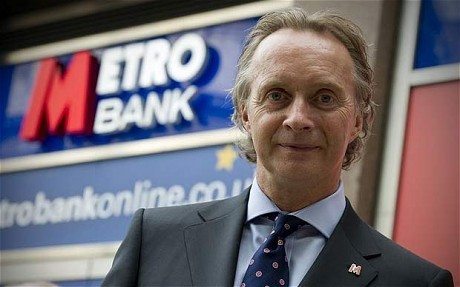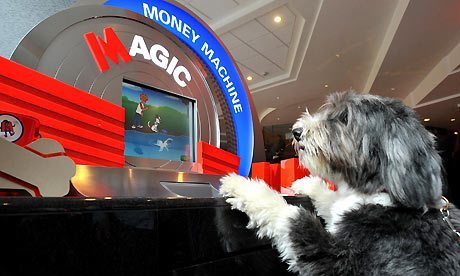
A couple of years ago, I was talking a lot about Metro Bank.
The reason being that it is Britain’s first brand spanking new retail bank in living memory.
The bank has since received lots of free publicity as the media love an upstart, but I have not blogged much about it.
That’s changing today as my good mate Anthony Thomson, Chair of Metro Bank, presented at the SWIFT Innotribe conference yesterday.

Talking with Anthony before his presentation, it’s obvious that things are moving along according to plan.
As he said, the funders of Metro Bank would not be putting money into the venture if they did not believe it would succeed, and with £126 million in new funding secured this month to support expansion, all seems on track.
Since the bank opened its first store in Holborn in summer 2010, it has now opened twelve stores, or branches if you prefer, across the London region (Borehamwood, Bromley, Chiswick, Croydon, Earl’s Court, Fulham Broadway, High Wycombe, Holborn, Hounslow, Kensington High Street, Tottenham Court Road and Uxbridge).
There are plans for a further eight to open this year: Brighton, Ealing, Hemel Hempstead, Reading, Romford, Staines, The City and Watford; and, opening one per month on an ongoing basis, plans to achieve 200 branches by 2020. That's another 180 over eighty-four months, or two per month, so pretty ambitious.
Funding so far has all been through private investment and fund managers such as Fidelity, but that will change in 2014 when the bank plans an IPO.
Anthony tells me that the bank has 80,000 customer accounts today and is opening around 2,000 new accounts a week, but it’s not all plain sailing as the FT points out that in the first 15 months of operation the bank made just 100 mortgage loans.
Nevertheless, the latest funding was over-subscribed and follows on from the first two funding rounds in 2010 of £75 million and £50 million, to give the bank over £250 million of backing and a Tier 1 Capital Ratio in the high teens (better than Basel III’s requirements and way above most European banks today).
Interestingly, the bank advocates many of the same messages I hear from other upstarts, such as Virgin Money and ING Direct.
For example, a big headline is: hire staff for attitude, not skills.
You can train people once they join the bank, but you don’t need them to be bankers up front.
As a result, the bank’s major hiring policy is whether, in the first interview, you smile.
After all, if you can’t smile at the first meeting with the bank, then when will you?
Nice and, of the over 3,000 people interviewed for jobs, 500 lucky folks work for Metro Bank with a further 200 to be hired this year.
Oh, and sixty percent of their people are aged between 18 and 30, so it’s a young bank too!
It’s also different in attitude.
Just look at this quote from the latest press release announcing their funding from Craig Donaldson, Chief Executive: “Londoners are flocking to us to open accounts and we’ve been blown away by local reaction to our style of community banking.”
Words like ‘flocking’ and phrases like ‘blown away’ are normally taken out of most bank press releases and so this would be worded more like: “Londoners are very supportive of our banks effrst and we have been particularly appreciative of the local reaction to our style of community banking”.
Similarly, it tries not to be a normal bank, with all stores child and dog friendly with balloons and lollipops for the children, customer toilets and baby changing facilities available for all, Magic Money Coin Counting Machines, and dog bowls and dog biscuits for our four legged friends.
They love dogs too.

Checkout the Duffy story for more.
Anthony made the point that if the bank cares a great deal about your dog, think how much they care about you!
This also sets them apart as, for example, another bank was asked if they would let dogs into their branches and the bank responded: “of course … we would just need to check it was OK with security first”.
Anthony made the point that their people are focused entirely on the customer and all staff, or team members as they are known internally, receive rewards for customer satisfaction metrics rather than sales incentives.
I’ve heard this before too, and it’s nice but not a recipe for rapid growth or profitability, although I get the sense that Metro Bank don’t want rapid growth for pure profit – it’s yet to make any money and lost £23 million in the first 16 months of operation – but expect growth through customer recommendation and loyalty in the same way that Metro Bank founder, Vernon Hill, created and built Commerce Bank in the USA.
There are other nuances of difference here too. For example, each store stays open from 8am till 8pm during the week, 8am - 6pm on Saturdays and 11am on Sundays. As Anthony pointed out, NatWest open half of their stores on a Saturday – the question is: “which ones?” and Metro Bank actually open at 7:50 and close at 20:10, as there is nothing worse than arriving at the branch early or late and finding it closed.
Nice.
So, the bank’s plan for 2020 is to have 200 branches, 5000 team members, 1 million customers and £20 billion of assets.
Ambitious and a good reason to jump on the IPO when it happens in 2014 unless, as some believe, you think that the branch-based model of banking is dead.
You make your own mind up.
For the full low-down on Metro Bank, checkout Vernon Hill’s presentation to the Financial Services Club last year.
Chris M Skinner
Chris Skinner is best known as an independent commentator on the financial markets through his blog, TheFinanser.com, as author of the bestselling book Digital Bank, and Chair of the European networking forum the Financial Services Club. He has been voted one of the most influential people in banking by The Financial Brand (as well as one of the best blogs), a FinTech Titan (Next Bank), one of the Fintech Leaders you need to follow (City AM, Deluxe and Jax Finance), as well as one of the Top 40 most influential people in financial technology by the Wall Street Journal's Financial News. To learn more click here...

